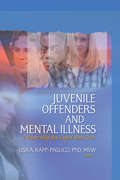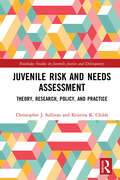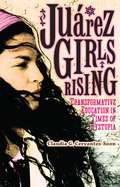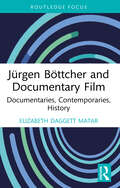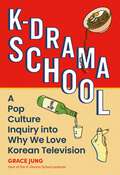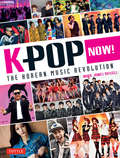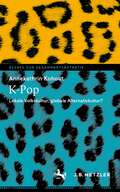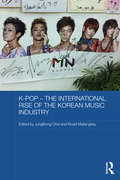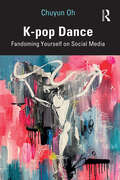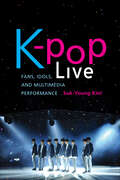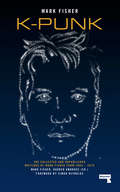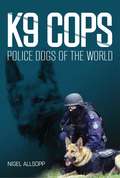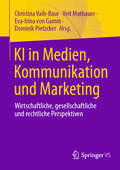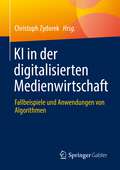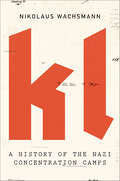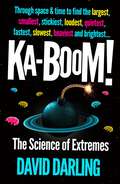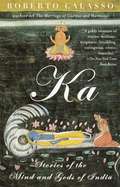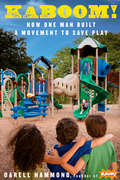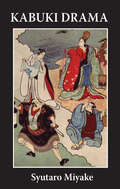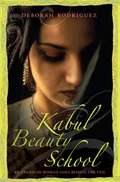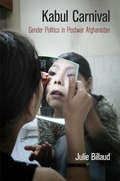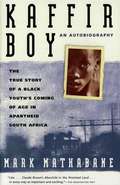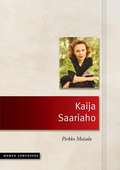- Table View
- List View
Juvenile Offenders and Mental Illness: I Know Why the Caged Bird Cries
by Lisa A. Rapp-PaglicciGet the latest research on juvenile offenders who have a mental illnessMost youths in the juvenile justice system who have one or more mental disorders do not receive proper treatment or education, nor do they serve sentences appropriate for their crimes. Juvenile Offenders and Mental Illness: I Know Why the Caged Bird Cries takes a detailed look at the latest theories and empirically based information on the causal and recidivism problems youths with mental disorders face in the juvenile justice system. Respected experts comprehensively discuss the range of problems found in the assessment of mentally ill juvenile offenders and offer practical, effective treatment solutions.Juvenile Offenders and Mental Illness explains the cost-effective methodologies and presents the latest data on recidivism rates and occurrences of depression, Attention Deficit Hyperactivity Disorder (ADHD), and/or alcohol or substance abuse disorder among delinquent adolescents. Research studies also include data gleaned from the application of the Piers-Harris Children&’s Self-Concept Scale, the Beck Hopelessness Scale, and other scales and surveys on participants. Other topics include revealing data on the prevalence of lifetime use of Ecstasy (MDMA) and its effects; female shoplifting and its relationship to mental illness; incidence of trauma exposure in incarcerated youth; and strategies to enhance the effectiveness of interventions. The book includes helpful tables to clearly illustrate empirical data and provides detailed references for each chapter.Juvenile Offenders and Mental Illness provides the freshest research and insightful discussion on: adolescent stalking depression ADHD alcohol/substance abuse disorders Post Traumatic Stress Disorder (PTSD) Ecstasy (MDMA) use and its association with symptoms of anxiety or depression the impact of mental health treatment intensity on the emotional and behavioral problems of youth in a treatment facility shoplifting by female teens behavioral problems and suicide-tendency in youths who have been sexually abused or traumatized effective prevention and the reduction of violence by at-risk adolescentsJuvenile Offenders and Mental Illness: I Know Why the Caged Bird Cries provides vital research data and treatment options for social workers, forensic psychologists, and those working in the juvenile justice system.
Juvenile Risk and Needs Assessment: Theory, Research, Policy, and Practice (Routledge Studies in Juvenile Justice and Delinquency)
by Christopher J. Sullivan Kristina K. ChildsThis book takes a comprehensive, analytic approach to understanding Juvenile Risk and Needs Assessment (JRNA), covering elements relevant to how the practice affects youths’ cases and the juvenile justice system. The work draws on both analysis of the extensive research on risk and needs assessment in the juvenile justice system as well as data from the authors’ recent work in the area. Authors Sullivan and Childs have extensive experience in teaching about and doing research on the juvenile justice system, including multiple studies on juvenile risk and needs assessment tools and their implementation. This expansive, integrative book leaves readers with a realistic sense of "where things stand" on the theory, research, policy, and practice of JRNA. By bringing together existing ideas and assessing them in depth, it identifies possible future paths and sparks ideas for improving the juvenile justice response to delinquent and at-risk youths. Juvenile Risk and Needs Assessment is essential reading for scholars of juvenile justice system impact and reform as well as practitioners engaged in youth and juvenile justice work ranging from the preventive to the rehabilitative stages.
Juárez Girls Rising: Transformative Education in Times of Dystopia
by Claudia G. Cervantes-SoonWorking-class girls in Ciudad Juárez grow up in a context marked by violence against women, the devastating effects of drug cartel wars, unresponsive and abusive authorities, and predatory U.S. capitalism: under constantly precarious conditions, these girls are often struggling to shape their lives and realize their aspirations. Juárez native Claudia G. Cervantes-Soon explores the vital role that transformative secondary education can play in promoting self-empowerment and a spirit of resistance to the violence and social injustice these girls encounter.Bringing together the voices of ten female students at Preparatoria Altavista, an innovative urban high school founded in 1968 on social justice principles, Cervantes-Soon offers a nuanced analysis of how students and their teachers together enact a transformative educational philosophy that promotes learning, self-authorship, and hope. Altavista&’s curriculum is guided by the concept of autogestión, a holistic and dialectical approach to individual and collective identity formation rooted in the students&’ experiences and a critical understanding of their social realities. Through its sensitive ethnography, this book shows how female students actively construct their own meaning of autogestión by making choices that they consider liberating and empowering.Juárez Girls Rising provides an alternative narrative to popular and often simplistic, sensationalizing, and stigmatizing discourses about those living in this urban borderland. By merging the story of Preparatoria Altavista with the voices of its students, this singular book provides a window into the possibilities and complexities of coming of age during a dystopic era in which youth hold on to their critical hope and cultivate their wisdom even as the options for the future appear to crumble before their eyes.
Jürgen Böttcher and Documentary Film: Documentaries, Contemporaries, History (Routledge Focus on Film Studies)
by Elizabeth Daggett MatarJürgen Böttcher and Documentary Film introduces the reader to this east-German filmmaker who, despite having made 40 films from the east side of the Berlin Wall, is practically unknown. Through the comparison of films made in the same year, one by an American and one by Böttcher, the author places him as ahead of his time in regards to technology, content, and style, and neck-and-neck with contemporary American filmmakers in cinéma vérité/direct cinema. The book moves beyond Böttcher’s dramatic biography to explore his role in the history of film. Was it actually the Germans who created sync sound for documentary? When and how were women featured? Offering a concise journey through the history of documentary film within this cultural context, but also a deep-dive into specific case-studies that show the nuances and complexities of classifying film texts, this volume will interest students and scholars of film studies, German cinema, cinéma vérité, film production, film theory, and world cinema.
K-Drama School: A Pop Culture Inquiry into Why We Love Korean Television
by Grace JungFrom the Emmy Award-winning Squid Game to streaming sensations like The Glory and Crash Landing on You, Korean television has emerged onto the global pop culture scene as compelling television—but what exactly makes these shows so irresistibly bingeable? And what can we learn about our societies and ourselves from watching them? From stand-up comedian and media studies PhD Grace Jung comes a rollicking deep dive into the cultural significance of Korean television. K-Drama School analyzes everything from common tropes like amnesia and slapping to conspicuous product placements of Subway sandwiches and coffee; to representations of disability, race and gender; to what Korea's war-torn history says about South Korea&’s media output and the stories being told on screen. With chapters organized by "lessons," each one inquiring into a different theme of Korean television, K-Drama School offers a groundbreaking exploration into this singular form of entertainment, from an author who writes with humor and heart about shows that spur tears and laughter, keeping us glued to the TV while making fans of us all. Shows discussed include: Squid Game, SKY Castle, Crash Course in Romance, Extraordinary Attorney Woo, My Mister, Something in the Rain, One Spring Night, DP, Guardian: The Lonely and Great God, Autumn in My Heart, Winter Sonata, Our Blues, and more.
K-Pop Now!: The Korean Music Revolution
by Mark James Russell"K-Pop Now! [...] features one hundred and twenty-eight glossy pages of Korean pop eye-candy." --KpopStarz.comK-Pop Now! takes a fun look at Korea's high-energy pop music, and is written for its growing legions of fans.<P><P> It features all the famous groups and singers, and takes an insider's look at how they have made it to the top.In 2012, Psy's song and music video "Gangnam Style" suddenly took the world by storm. But K-Pop, the music of Psy's homeland of Korea has been winning fans for years with its infectious melodies and high-energy fun. Featuring incredibly attractive and talented singers and eye-popping visuals, K-Pop is the music of now.Though K-Pop is a relatively young phenomenon in the West, it is rapidly gaining traction and reaching much larger audiences--thanks in large part to social media like Facebook, YouTube and Twitter. Top K-Pop acts get ten million to thirty million hits for their videos--the Girls Generation single "Gee" has over a hundred million views!In K-Pop Now! you'll find:Profiles of all the current K-Pop artists and their hits A look at Seoul's hippest hot spots and hangouts Interviews with top artists like Kevin from Ze:A and Brian Joo A look at future K-Pop idols
K-Pop: Lokale Volkskultur, globale Alternativkultur? (Essays zur Gegenwartsästhetik)
by Annekathrin KohoutDas „K“ in „K-Pop“ steht nicht einfach für „koreanisch“. Es ist ein Branding, ein Corporate Design, ja ein globaler ästhetischer Trend. Neben K-Popmusik und K-Dramen formieren auch Food-, Mode- und Beauty-Produkte die sogenannte Hallyu („Koreanische Welle“). Wie es Hollywood nicht ohne das Kino gegeben hätte, ist K-Pop ohne Soziale Medien undenkbar. An die Stelle glamouröser Stars und kreischender Fans treten smarte, gut vernetzte Akteure. Doch in die Begeisterung mischen sich auch kritische Stimmen. Die dahinterstehende Industrie und die transportierten Rollenbilder provozieren zunehmend kontroverse interkulturelle Diskurse.
K-pop - The International Rise of the Korean Music Industry (Media, Culture and Social Change in Asia)
by JungBong Choi Roald MaliangkayK-pop, described by Time Magazine in 2012 as "South Korea’s greatest export", has rapidly achieved a large worldwide audience of devoted fans largely through distribution over the Internet. This book examines the phenomenon, and discusses the reasons for its success. It considers the national and transnational conditions that have played a role in K-pop’s ascendancy, and explores how they relate to post-colonial modernisation, post-Cold War politics in East Asia, connections with the Korean diaspora, and the state-initiated campaign to accumulate soft power. As it is particularly concerned with fandom and cultural agency, it analyses fan practices, discourses, and underlying psychologies within their local habitus as well as in expanding topographies of online networks. Overall, the book addresses the question of how far "Asian culture" can be global in a truly meaningful way, and how popular culture from a "marginal" nation has become a global phenomenon.
K-pop Dance: Fandoming Yourself on Social Media
by Chuyun OhThis book is about K-pop dance and the evolution and presence of its dance fandom on social media. Based on five years of ethnographic fieldwork, interviews, choreography, and participation-observation with 40 amateur and professional K-pop dancers in New York, California, and Seoul, the book traces the evolution of K-pop dance from the 1980s to the 2020s and explains its distinctive feature called ‘gestural point choreography’ – front-driven, two-dimensional, decorative and charming movements of the upper body and face – as an example of what the author theorizes as ‘social media dance.’ It also explores K-pop cover dance as a form of intercultural performance, suggesting that, by imitating and idolizing K-pop dance, fans are eventually ‘fandoming’ themselves and their bodies. Presenting an ethnographic study of K-pop dance and its fandom, this book will be a valuable resource for students and scholars of Media Studies, Korean Studies, Performance Studies, and Dance.
K-pop Live: Fans, Idols, and Multimedia Performance
by Suk-Young Kim1990s South Korea saw the transition from a military dictatorship to a civilian government, from a manufacturing economy to a postindustrial hub, and from a cloistered society to a more dynamic transnational juncture. These seismic shifts had a profound impact on the media industry and the rise of K-pop. In K-pop Live, Suk-Young Kim investigates the meteoric ascent of Korean popular music in relation to the rise of personal technology and social media, situating a feverish cross-media partnership within the Korean historical context and broader questions about what it means to be "live" and "alive." Based on in-depth interviews with K-pop industry personnel, media experts, critics, and fans, as well as archival research, K-pop Live explores how the industry has managed the tough sell of live music in a marketplace in which virtually everything is available online. Teasing out digital media's courtship of "liveness" in the production and consumption of K-pop, Kim investigates the nuances of the affective mode in which human subjects interact with one another in the digital age. Observing performances online, in concert, and even through the use of holographic performers, Kim offers readers a step-by-step guide through the K-pop industry's variegated efforts to diversify media platforms as a way of reaching a wider global network of music consumers. In an era when digital technology inserts itself into nearly all social relationships, Kim reveals how "what is live" becomes a question of how we exist as increasingly mediated subjects, fragmented and isolated by technological wonders while also longing for a sense of belonging and being alive through an interactive mode of exchange we often call "live."
K-punk: The Collected and Unpublished Writings of Mark Fisher
by Mark Fisher Simon Reynolds Darren AmbroseA comprehensive collection of the writings of Mark Fisher (1968-2017), whose work defined critical writing for a generation.This comprehensive collection brings together the work of acclaimed blogger, writer, political activist and lecturer Mark Fisher (aka k-punk). Covering the period 2004 - 2016, the collection will include some of the best writings from his seminal blog k-punk; a selection of his brilliantly insightful film, television and music reviews; his key writings on politics, activism, precarity, hauntology, mental health and popular modernism for numerous websites and magazines; his final unfinished introduction to his planned work on "Acid Communism"; and a number of important interviews from the last decade. Edited by Darren Ambrose and with a foreword by Simon Reynolds.
K9 Cops: Police Dogs of the World (Big Sky Publishing Ser.)
by Nigel AllsoppIn this fascinating book, Nigel Allsopp lifts the lid on the world of police dogs, examining the vital roles they play both in Australia and around the world. Despite the numerous high-tech devices now available to law-enforcement officials, `K9's - as they're known in the trade - remain an indispensable part of police work in a range of fields, notably terrorism and border protection. K9s may sometimes be sent into difficult and dangerous situations, but this is never done without care and concern, for at the heart of their role is the intimate and symbiotic relationship between dog and handler. K9 Cops explores the history, training and current use of police dogs, as well as considering what future dogs have in modern law enforcement. It also includes an A-Z of police canine units in 47 countries. For all police and military personnel, K9 Cops is an informative, must-read book. For the rest of us, it is an entertaining and heart-warming account that dog lovers the world over will enjoy.
KI als Zukunftsmotor für Verlage: Potenziale und Fallbeispiele für KI-Anwendungen in der Buchbranche
by Okke SchlüterGenerative KI ist ein Game Changer für Verlage. Wie aber sollten Verlage darauf reagieren? Da in der Publishing-Branche Daten eine wichtige Rolle spielen, können KI-Technologien auch hier wertvolle Beiträge leisten. Diese Innovationen sichern gleichzeitig die Zukunft der Verlagsbranche gegenüber globalen Tech-Konzernen ab, die selbst Publishing anbieten. Ziel des Bandes ist es daher, über konkrete Potenziale in Verlagen zu sprechen, seien es z. B. Manuskriptarbeit, Marketingkommunikation oder Nachauflagen. Mit einer Einführung in KI, drei konkreten Fallbeispielen und einer Potenzialanalyse zu ChatGPT.
KI in Medien, Kommunikation und Marketing: Wirtschaftliche, gesellschaftliche und rechtliche Perspektiven
by Dominik Pietzcker Christina Vaih-Baur Veit Mathauer Eva-Irina von GammDer Herausgeberband beleuchtet den aktuellen globalen Einsatz von Künstlicher Intelligenz im Kommunikationssektor aus wirtschaftlicher, gesellschaftlicher und rechtlicher Perspektive. Auch der Blick der Rezipienten auf Produkte künstlicher Intelligenz wird dabei empirisch untersucht. Was sind ihre Erwartungen, Idiosynkrasien und Einstellungen gegenüber Künstlicher Intelligenz und ihren vielfältigen Anwendungen? Die Beiträge umfassen neben wissenschaftlichen Analysen auch aktuelle Trends aus Sicht von Praktikern und Experten. Die kritisch-analytische Betrachtung von KI-Anwendungen in Sub- und Populärkultur rundet den gesamten Band ab.
KI in der digitalisierten Medienwirtschaft: Fallbeispiele und Anwendungen von Algorithmen
by Christoph ZydorekDie Entwicklungstrends in der fortschreitenden Algorithmisierung des Mediensektors werden in diesem Band für verschiedene Teilsektoren der Medien (Games, Musik, Bücher, Audio/Video, Nachrichtenmedien) anhand aktueller Beispiele aus der Forschung, der Entwicklung und der Praxis der Medienwertschöpfung demonstriert. Es erweist sich, dass zunehmend mehr und größere Tätigkeitsbereiche, die früher ausschließlich durch menschliche Arbeitsleistung, professionelle Gestaltungskompetenz und Kreativität geprägt waren, durch unterschiedliche Formen automatisierter und zunehmend „intelligenter“ Routinen übernommen werden. Die diesen Routinen innewohnenden ökonomischen Rationalisierungspotenziale treiben den Prozess der Ersetzung menschlicher Arbeit durch Kapital in der Wertschöpfungskette der Medieninhalte schnell und tiefgreifend voran.
KL: A History of the Nazi Concentration Camps
by Nikolaus WachsmannThe “deeply researched, groundbreaking” first comprehensive history of the Nazi concentration camps (Adam Kirsch, The New Yorker).In a landmark work of history, Nikolaus Wachsmann offers an unprecedented, integrated account of the Nazi concentration camps from their inception in 1933 through their demise, seventy years ago, in the spring of 1945. The Third Reich has been studied in more depth than virtually any other period in history, and yet until now there has been no history of the camp system that tells the full story of its broad development and the everyday experiences of its inhabitants, both perpetrators and victims, and all those living in what Primo Levi called “the gray zone.”In KL, Wachsmann fills this glaring gap in our understanding. He not only synthesizes a new generation of scholarly work, much of it untranslated and unknown outside of Germany, but also presents startling revelations, based on many years of archival research, about the functioning and scope of the camp system. Closely examining life and death inside the camps, and adopting a wider lens to show how the camp system was shaped by changing political, legal, social, economic, and military forces, Wachsmann produces a unified picture of the Nazi regime and its camps that we have never seen before.A boldly ambitious work of deep importance, KL is destined to be a classic in the history of the twentieth century.Praise for KLA Wall Street Journal Best Book of 2015A Kirkus Reviews Best History Book of 2015Finalist for the National Jewish Book Award in the Holocaust category“[A] monumental study . . . a work of prodigious scholarship . . . with agonizing human texture and extraordinary detail . . . Wachsmann makes the unimaginable palpable. That is his great achievement.” —Roger Cohen, The New York Times Book Review“Wachsmann’s meticulously detailed history is essential for many reasons, not the least of which is his careful documentation of Nazi Germany’s descent from greater to even greater madness. To the persistent question, “How did it happen?,” Wachsmann supplies voluminous answers.” —Earl Pike, The Plain Dealer (Cleveland)
Ka-boom!: The Science of Extremes
by David DarlingWhat&’s the brightest light on Earth? The coldest corner of the universe? The blackest material ever made? The most poisonous substance in nature? &‘You will learn something new in every chapter, on every page and probably in every paragraph. Hugely entertaining.&’ Kit Yates, author of The Maths of Life and Death Ka-boom! probes extremes of size and speed, depth and density, and reveals the stickiest, sweetest, smelliest and nastiest substances known to science. In an unabashed celebration of the exceptional, David Darling takes an enlightening journey through the universe&’s weirdest and most wonderful extremes. Travel to far-flung galaxies in pursuit of habitable planets and extra-terrestrial life. Journey to the rainforests of South America and discover the top-speed of the notoriously sluggish sloth. Find out how Earth&’s hardiest creatures – tardigrades or &‘water bears&’ – ended up living on the moon. And meet the scientists and engineers using these quirks of nature to design faster computers, produce greener energy and revolutionise space travel.
Ka: Stories of the Mind and Gods of India (Vintage International)
by Roberto CalassoIn "the very best book about Hindu mythology that anyone has ever written" (The New Republic) Calasso plunges Western readers into the mind of ancient India. He begins with a mystery: Why is the most important god in the Rg Veda, the oldest of India's sacred texts, known by a secret name—"Ka," or Who?What ensues is not an explanation, but an unveiling. Here are the stories of the creation of mind and matter; of the origin of Death, of the first sexual union and the first parricide. We learn why Siva must carry his father's skull, why snakes have forked tongues, and why, as part of a certain sacrifice, the king's wife must copulate with a dead horse. A tour de force of scholarship and seduction, Ka is irresistible.
KaBOOM!: How One Man Built a Movement to Save Play
by Darell HammondKaBOOM! is the powerful, uplifting journey of a man who grew up in a group home with his seven brothers and sisters and went on to build a world-class nonprofit that harnesses the power of community to improve the lives of children.In 1995, Darell Hammond read an article in the Washington Post about an unthinkable tragedy: Two young children suffocated in a car on a hot summer day in southeast Washington, DC. The story indicated that the children had nowhere to play; in the absence of a playground, they had climbed into an abandoned car. Reading the article fueled Hammond's sense of injustice, and his life's mission came into focus. Hammond founded KaBOOM!, a national nonprofit that provides communities with tools, resources, and guidance to build and renovate playgrounds and playspaces. In some of the toughest and poorest neighborhoods in North America, 2,000 barren spaces have been transformed by KaBOOM! and more than a million volunteers and community members into kid-designed, fun, and imaginative places to play. This is the story of a man with a vision, a man who believes that play is the best natural resource in a creative economy and that kids need more of it. Play is not a luxury but a necessity for their lives. Through hard work, commitment, and the conviction that access to a safe play environment is the fundamental right of all children, Hammond built an organization that has touched the lives of countless children and families.Hammond's story demonstrates how one idealist can change the world and how small, civic-minded steps create a ripple effect that can transform communities and eventually the world at large.
Kabuki Drama
by MiyakeFirst published in 2006. Routledge is an imprint of Taylor & Francis, an informa company.
Kabul Beauty School: An American Woman Goes Behind the Veil
by Deborah RodriguezThis is the most colourful, warm, honest and at times funny view into the lives of women in Afghanistan and Deborah Rodriguez, the beautician who came from Michigan, USA, and was their teacher at the Kabul Beauty School. Since the book was published the Afghan government has clamped down on the school and Debbie had to flee the country. In this new B format edition she writes in the Afterword about her escape from Afghanistan, the decision some of her students made to leave their country, and the situa...
Kabul Carnival: Gender Politics in Postwar Afghanistan (The Ethnography of Political Violence)
by Julie BillaudAfter the attacks of September 11, 2001, the plight of Afghan women under Taliban rule was widely publicized in the United States as one of the humanitarian issues justifying intervention. Kabul Carnival explores the contradictions, ambiguities, and unintended effects of the emancipatory projects for Afghan women designed and imposed by external organizations. Building on embodiment and performance theory, this evocative ethnography describes Afghan women's responses to social anxieties about identity that have emerged as a result of the military occupation.Offering one of the first long-term on-the-ground studies since the arrival of allied forces in 2001, Julie Billaud introduces readers to daily life in Afghanistan through portraits of women targeted by international aid policies. Examining encounters between international experts in gender and transitional justice, Afghan civil servants and NGO staff, and women unaffiliated with these organizations, Billaud unpacks some of the paradoxes that arise from competing understandings of democracy and rights practices. Kabul Carnival reveals the ways in which the international community's concern with the visibility of women in public has ultimately created tensions and constrained women's capacity to find a culturally legitimate voice.
Kaffir Boy: The True Story of a Black Youth's Coming of Age in Apartheid South Africa
by Mark MathabaneThis is a rare look inside the festering adobe shanties of Alexandra, one of South Africa's notorious black townships. Rare because it comes...from the heart of a passionate young African who grew up there.
Kaija Saariaho
by Pirkko MoisalaThis book is the first comprehensive study of the music and career of contemporary composer Kaija Saariaho. Born in Finland in 1952, Saariaho received her early musical training at the Sibelius Academy, where her close circle included composer and conductor Esa-Pekka Salonen. She has since become internationally known and recognized for her operas L'amour de loin and Adriana Mater and other works that involve electronic music. Her influences include the spectral analysis of timbre, especially string sounds, micropolyphonic techniques, as well as the visual and literary arts and sounds in the natural world. Pirkko Moisala approaches the unique characteristics of Saariaho's music through composition sketches, scores, critical reviews, and interviews with the composer and her trusted musicians.
